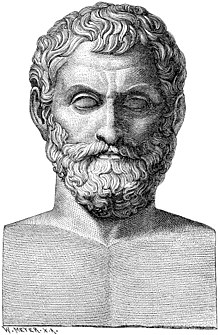Thales of Miletus
| Thales of Miletus | |
|---|---|
 |
|
| Born | c. 624 BC |
| Died | c. 546 BC |
| Era | Pre-Socratic philosophy |
| Region | Western philosophy |
| School | |
|
Main interests
|
|
|
Notable ideas
|
|
|
Influenced
|
|
Thales of Miletus (/ˈθeɪliːz/; Greek: (ὁ Μῑλήσιος), Thalēs; c. 624 – c. 546 BC) was a pre-Socratic Greek/Phonecian philosopher, mathematician and astronomer from Miletus in Asia Minor, current day Milet in Turkey and one of the Seven Sages of Greece. Many, most notably Aristotle, regard him as the first philosopher in the Greek tradition, and he is otherwise historically recognised as the first individual in Western civilisation known to have entertained and engaged in scientific philosophy.
Thales is recognized for breaking from understanding the world and universe by mythological explanations to instead finding explanations for the existence of natural things and phenomena by theories and hypothesis, i.e. science. Almost all of the other Pre-Socratic philosophers proceed after him to provide explanations of natural things by way of there being a unity of everything because of the existence of a single ultimate substance, instead of explanation given by mythology. Aristotle reported Thales's hypothesis that the originating principle of nature and the nature of matter was a single material substance: water.
...
Wikipedia
